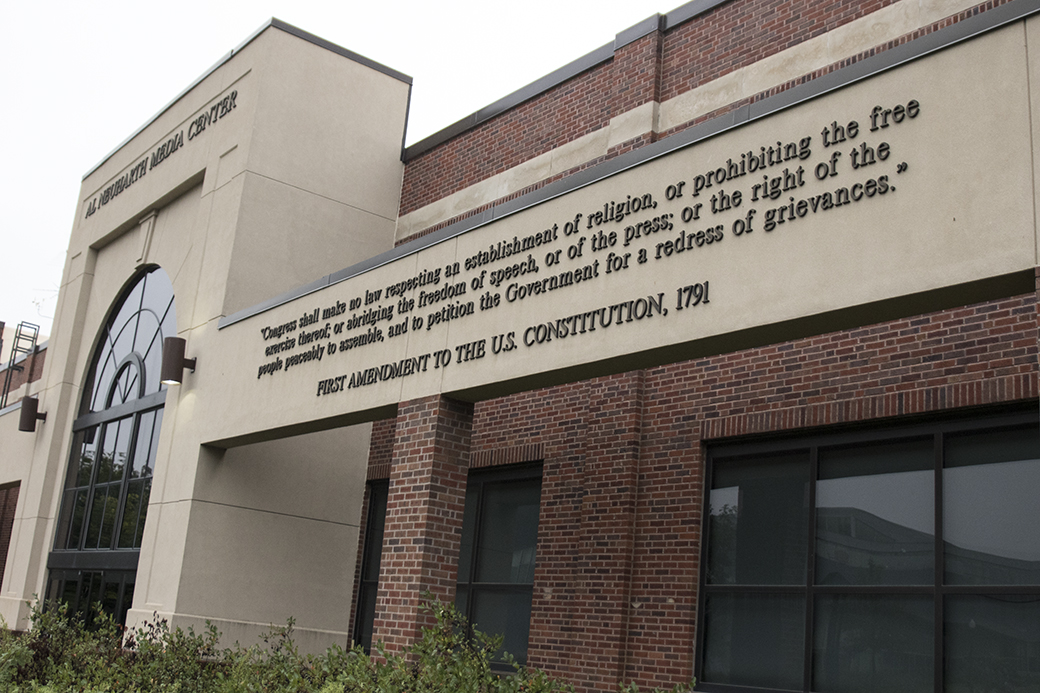
Editorial: USD should alter free speech policies
Across of the outer wall of the Al Neuharth Media Center are the words of the renowned First Amendment: “Congress shall make no law respecting an establishment of religion, or prohibiting the free exercise thereof; or abridging the freedom of speech, or of the press; or the right of the people peaceably to assemble, and to petition the Government for a redress of grievances.”
Regarded by many as the greatest of our liberties, the freedom of speech is something Americans hold dearly to their hearts. The ability to speak our minds, even when deemed dangerous or controversial, is partly why America is the center of cultural enterprise and intellectual endeavor.
Unfortunately, USD doesn’t live up to this principle. While the etchings on the Neuharth Center are endearing, the actual policy of the university is less so.
The Foundation for Individual Right in Education, or FIRE, has taken note of USD’s policies, and has given the university a “red” designation.
This means that USD has at least one policy that “clearly and substantially restricts free speech.” According to FIRE, there are two policies that warrant a “red” label at USD.
The first resides in the Student Handbook under Guidelines for the Awareness and Prevention of Acts of Cultural Insensitivity and Bullying at USD. Specifically, section five states: “Using university property (i.e. the USD internet server) to bully other students (cyber bullying) or express feelings of hatred via Facebook, Twitter, email or other forms of social media is not allowed.”
Unkind or insensitive words are things we all should do our best to avoid. Nonetheless, “hate speech” is protected by the Constitution, and since USD is public institution, it must abide by the First Amendment. In fact, policies similar to ours have fallen in federal court. While preventing bullying is an admirable pursuit, sacrificing free speech is a line no university should cross.
The second red light policy lies in USD’s Free Speech Policy, which outlines areas where free speech is allowed. The policy states that the Muenster University Center, Muenster University Center Courtyard and the I.D. Weeks Library Courtyard are the only areas where free speech is allowed.
Much like hate speech codes, free speech zones have come under legal scrutiny. The University of Cincinnati’s speech zones were recently ruled unconstitutional in federal court.
Beyond the legal issues, there’s a principle at stake: the principle of free thought and free inquiry.
Socrates, the philosopher who’s considered the beginning of western tradition, was sentenced to death because his way of thinking “corrupted” the minds of young people. Galileo, the astronomer who said that the Sun was the center of the Solar System, went to trial for challenging the predominant religious view of the cosmos.
Western values, whether it be science or politics, rest in the freedom of speech.
USD, in solidarity with the words spread across the Al Neuharth building, should revisit its free speech policies. To be fair, these policies aren’t strictly enforced and more just words on a page. Nonetheless, changes should be made so that students’ rights are clearly upheld in policy, both in legal terms and in principle.
We take pride in our diversity: let’s extend that diversity to our intellects, and allow students to freely express their thoughts, good or bad, and let others freely challenge those thoughts.
